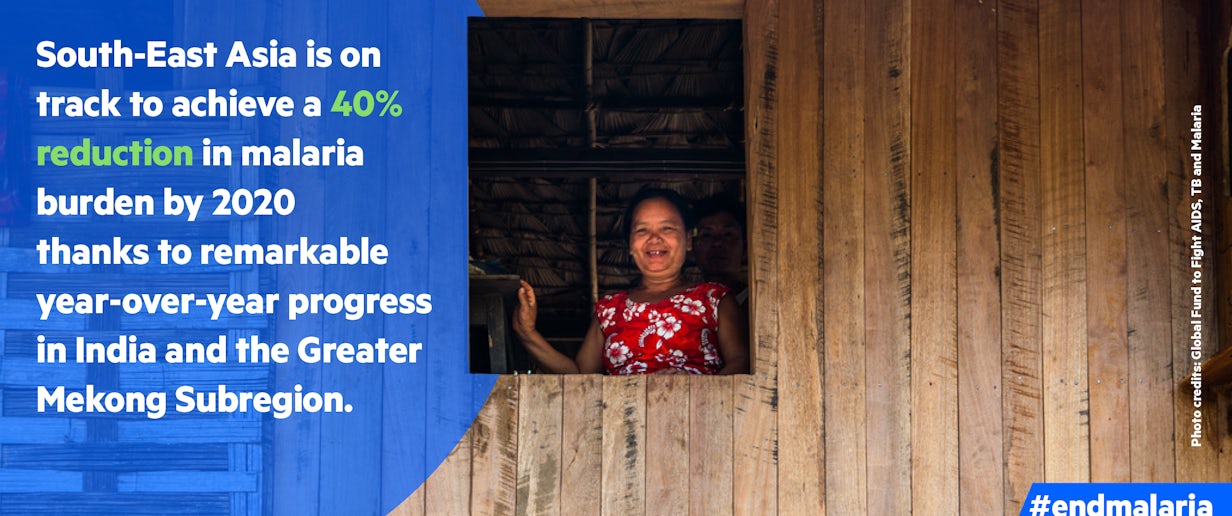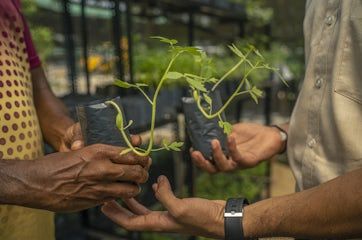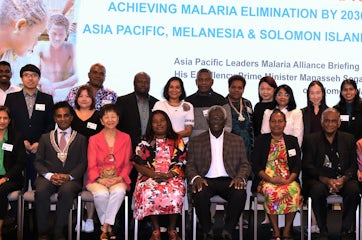Asia-Pacific records outstanding progress against malaria, yet COVID-19 pandemic still looms large over a malaria-free future
by •

- South-East Asia region on track to achieve 40% reduction in malaria cases by 2020
- India reduces cases of malaria cases by 1.2 million over past two years
- WHO World Malaria Report 2020 shows great strides towards elimination in Asia-Pacific
SINGAPORE - 30 November 2020: Today the Asia Pacific Leaders Malaria Alliance (APLMA) and the RBM Partnership to End Malaria welcome remarkable year-over-year progress achieved against malaria in South-East Asia, which puts the region on track to reducing malaria cases by 40% over five years. These achievements suggest countries have held the line in protecting historic gains against the disease despite the unprecedented challenges of the COVID-19 pandemic.
According to the World Health Organization (WHO)’s annual World Malaria Report 2020, published today, the Greater Mekong Subregion has reduced malaria cases and deaths by over 90% since 2000, despite the emerging local challenge of drug and insecticide resistance. Meanwhile, in India – the country with the highest burden of malaria outside of Africa – cases were reduced by 1.2 million over the last two years.
Furthermore, China and Malaysia have both registered zero malaria cases for three consecutive years and kept malaria at bay despite COVID-19. This puts both countries on-track to be certified malaria-free next year. Since 2000, 10 countries have been certified malaria free by WHO.
As a result, WHO’s South-East Asia region is on track to achieve a 40% reduction in malaria case incidence by 2020 – a global target set in 2016. Asia-Pacific leaders have also set 2030 as the regional target for malaria elimination.
Since 2000, the region has reduced cases of malaria by 69% and related deaths by 70%. India made a significant contribution to this achievement, reducing malaria cases from 20 million to just over 5 million in 2019.
With ongoing commitment, optimized use of current resources and new investments, the region will help deliver on the global promise of ending malaria within a generation.
Professor Yongyuth Yuthavong, RBM Partnership Board Member, malaria scientist and former Deputy Prime Minister of Thailand, commented:
“The Greater Mekong Subregion has made tremendous progress towards elimination, even in the face of growing insecticide and drug resistance, reducing malaria cases and deaths by over 90% since 2000. This achievement is in no small part thanks to the development and scale up of life-saving tools, many of which were not available 20 years ago, and cross-border collaboration that improved and increased surveillance. Today, we must continue investing in innovations that will help us stay ahead of a changing vector and parasite.”
Nonetheless, the COVID-19 pandemic and its economic fallout threatens long-term progress towards malaria elimination. The commitments and actions countries make in the next few years will therefore be crucial for getting back on track to achieve the ambitious and realistic malaria reduction targets. Notably, COVID-19 has reinforced the critical importance of timely, accurate and localized data and innovation to effectively fight infectious diseases like malaria.
This year, the global malaria community has shown unprecedented collaboration in responding to the challenges of COVID-19. Partners across the Asia Pacific region – including national malaria control programmes and global suppliers of essential malaria tools – have played a critical role in addressing supply chain disruptions of life-saving malaria interventions and personal protective equipment, resolving bottlenecks in campaign delivery, and stepping up malaria surveillance.
Dr Sarthak Das, CEO of the Asia Pacific Leaders Malaria Alliance, added:
“Consistent leadership across much of Asia Pacific amidst emerging antimalarial resistance and COVID-19 has protected hard-earned progress over the past decade. While there is much to celebrate in regard to progress, we must continue to not only support nations on the verge of elimination but also ensure that higher-burden countries like India, Indonesia and Papua New Guinea are not forgotten. These actions will sustain the momentum towards our goal of eliminating malaria in the Asia Pacific by 2030”.
Since 2000, thanks to committed global partnership, the world has made tremendous progress against malaria, saving 7.6 million lives and preventing 1.5 billion new infections. In 2019, 409,000 people died from malaria and there were 229 million malaria cases globally.
Dr Abdourahmane Diallo, CEO of the RBM Partnership to End Malaria, concludes:
“Malaria’s impact in 2020 would have been much worse if not for the incredible efforts by countries and their partners, but the reality is that every malaria death today is avoidable. We have seen how the malaria toll, especially among young children, increases during health crises. We must continue to tackle malaria and COVID together to save more lives and protect heath systems”.




